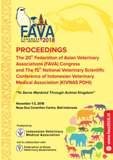SA-15 Antibiotic Resistance Microbial Infection in Five Dogs in Bali
Abstract
Antimicrobial Resistance is a global public health problem that is influenced by the use of antimicrobial agents in humans, animals and elsewhere. Abuse of antibiotics has increased the prevalence of human and animal microbioma resistance genes over the last 75 years (Pal et al, 2016). Antibiotic resistance occurs when bacteria are able to reduce or eliminate the effectiveness of drugs, chemicals or other agents designed to cure or prevent infection. Thus bacteria survive and continue to multiply causing more harm (Bisht et al 2009). A strain is resistant against an antibiotic if its minimal inhibitory concentration (MIC) is higher than for the corresponding parental wild-type strain (Martinez et al, 2015;Bengtsson-palme, 2017). As well as humans, pet animal like dogs that have certain medical conditions that are often prescribed antibiotics have a higher risk of infection with antibiotic resistant bacteria. Antibiotic resistance in dog or other pet animal causes very adverse effects such as treatment failure with antibiotics that can cause severe infections, complications, increased mortality. Antibiotic resistance leads to extended treatment time leading to increased medical expenses. Another impact that is considered very dangerous is the zoonotic potential of resistant microbes that can be transmitted to humans. Infections that do not respond to antibiotics appropriately, should be suspected of having an antibiotic resistant microbial infection. Actibiotic sensitivity test is necessary in the selection and use of appropriate antibiotics for therapy.

